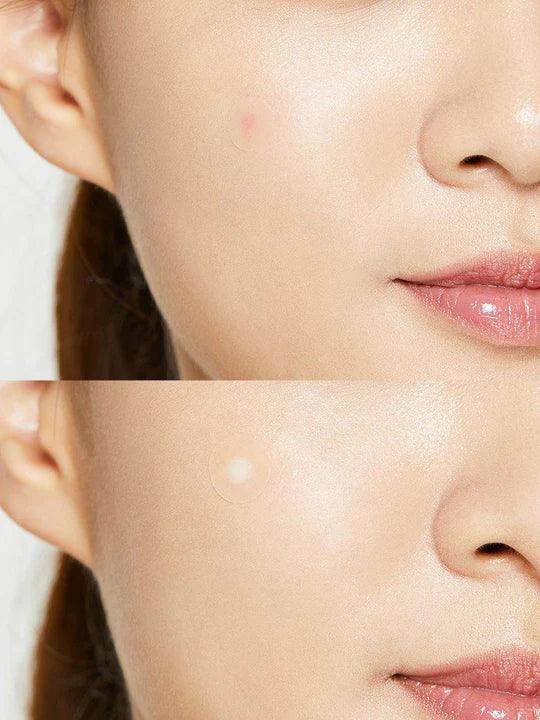
How to Treat the 6 Most Common Skin Problems
Partager
Having clear beauty goals can make your skincare routine much easier.
Setting a goal helps you focus on the right products, avoid unnecessary purchases, and assess your progress. If you're feeling overwhelmed by the multitude of advice online, don't worry: let's break down the six most common skin concerns and see which treatments and ingredients you can use to effectively treat them.
Most treatments include serums and ampoules to apply after your toner and before your moisturizer.
Ready to discover how to achieve your skin goals? Let's go!
1. Fade acne scars
Acne is difficult enough to manage, but the scars left by pimples can be even more daunting. The more inflammatory a breakout is, the more likely it is to leave a scar. These scars can appear raised or indented. Because they often affect deeper layers of the skin, they can be difficult to remove.
Treatment
Retinoids are one of the most effective treatments for targeting deep-seated acne scars. They stimulate collagen production, improve skin texture, and promote cell renewal. Acid exfoliants like glycolic or lactic acid smooth skin texture and help fade scars.
Pro tip
Use pimple patches to protect your skin when a pimple appears. These patches reduce inflammation, promote faster healing, and prevent bacteria from entering.
2. Reduce hyperpigmentation
Hyperpigmentation appears as dark spots, often caused by excessive melanin production. UV rays, hormonal changes, and acne scars can be responsible. Sun exposure can also worsen existing hyperpigmentation.
Treatment
Your first line of defense against hyperpigmentation is daily SPF to prevent future damage. Brightening ingredients like vitamin C , retinol , or gentle exfoliating acids (AHAs) like lactic acid help reduce existing spots. Active ingredients like niacinamide , kojic acid, or arbutin are also very effective at fading spots and evening out skin tone.
Pro tip
Use vitamin C- rich products in the morning to protect skin from UV damage, and retinol in the evening to speed up cell renewal without worrying about photosensitivity.
3. Treat enlarged pores and blackheads
Enlarged pores and blackheads are often caused by a buildup of sebum and dead skin cells. If the sebum oxidizes, it turns black, forming a visible blackhead.
Treatment
Double cleansing is your ally for removing makeup, oil, and pore-clogging impurities. Look for oil-based cleansers and exfoliants containing salicylic acid , which penetrates pores to dissolve blockages. Clay masks are also effective at absorbing excess oil.
Pro tip
Avoid extracting blackheads yourself with tools, as this can worsen inflammation and cause scarring. Leave this task to a professional or use dedicated products to minimize risks.
4. Replenish dehydrated skin
It is important to differentiate between dry skin and dehydrated skin . Dry skin lacks oils, while dehydrated skin lacks water. Dehydrated skin can affect all skin types and is often the result of a damaged skin barrier.
Treatment
Start by drinking enough water to rehydrate your body from the inside out. In your skincare routine, opt for products rich in hyaluronic acid to help retain water in your skin. Also try probiotics like kombucha or fermented essences, which promote a healthy skin microbiome.
Pro tip
Apply your skincare to skin that is still slightly damp after showering to lock moisture into the skin.
5. Smooth fine lines and wrinkles
With age, collagen production declines, making skin thinner and prone to fine lines and wrinkles. Repetitive movements (smiling, frowning) accentuate these marks, especially on skin that has lost its elasticity.
Treatment
Protect your skin with daily sunscreen to prevent further damage. Antioxidants like vitamin C and retinol are essential for boosting collagen production. Bakuchiol , a natural alternative to retinol, offers similar effects while being less irritating.
Pro tip
Choose a sunscreen with a PA rating for UVA protection, in addition to the SPF rating which only protects against UVB rays.
6. Soothe sensitive skin
Sensitive skin is prone to redness, irritation, and breakouts. It reacts to changes in temperature, harsh ingredients, or conditions like eczema and rosacea. Sensitized skin can also result from over-exfoliation or harsh products.
Treatment
Opt for creams and serums containing soothing ingredients like aloe vera , Centella Asiatica , and chamomile , which calm inflammation and strengthen the skin barrier. Ceramides and allantoin form a protective barrier against irritants.
Pro tip
Always test your new products on a small area of skin before using them on your entire face to avoid unwanted reactions.
By using the right treatments and incorporating the right ingredients into your skincare routine, you can effectively address your skin concerns. Check out our selection of K-beauty products at Coree Beauty and find the perfect skincare products to achieve your beauty goals!



